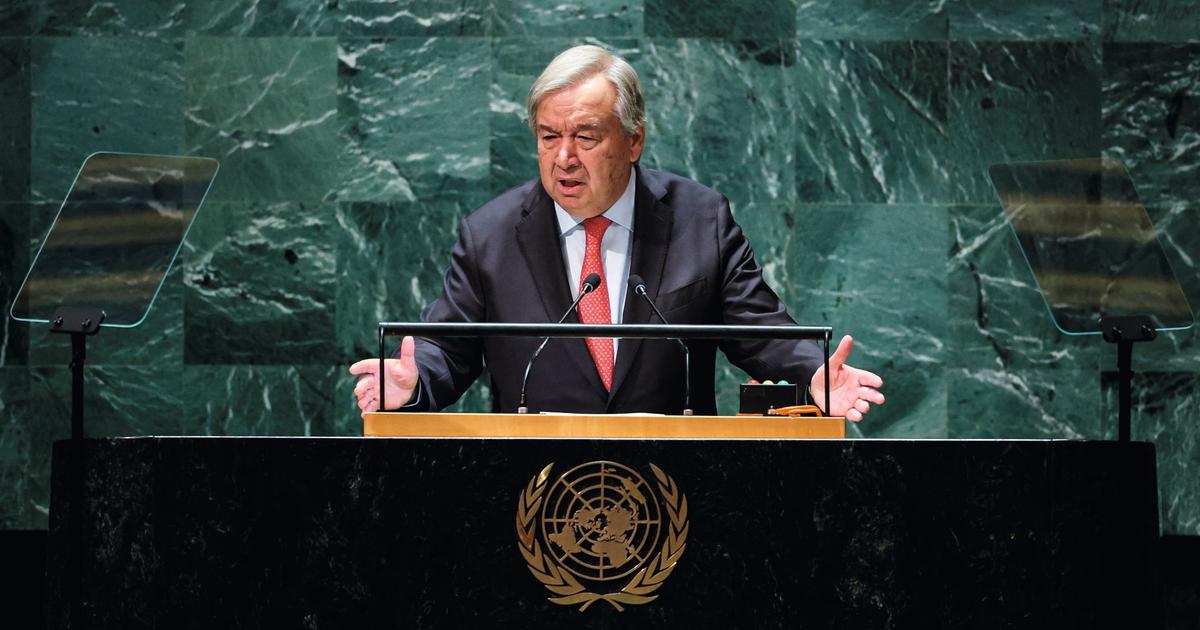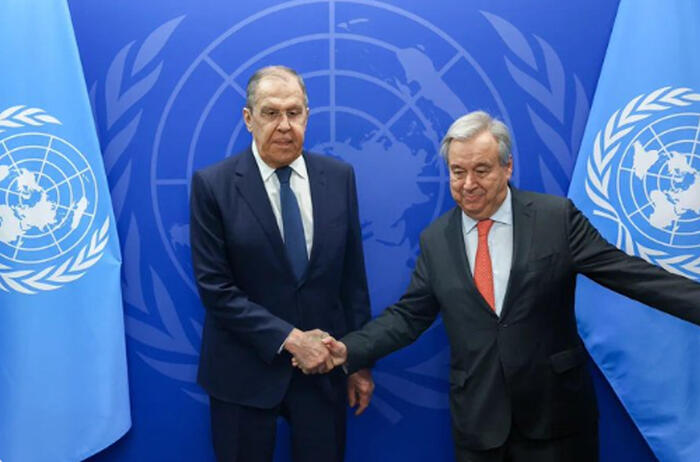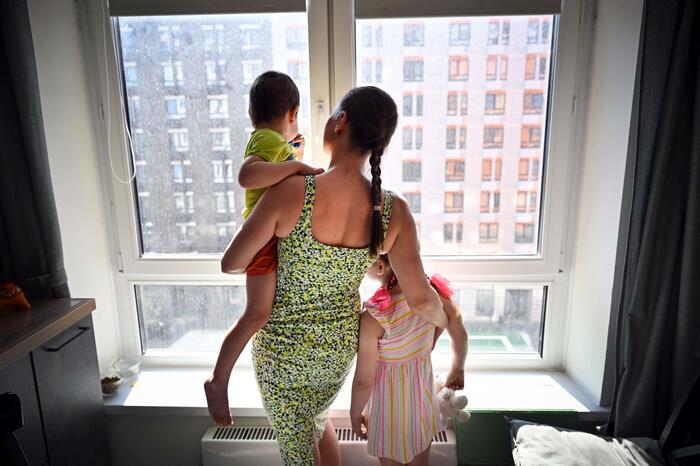One year after the invasion of Ukraine, the three blocs into which global diplomacy has been divided (the West, the global south, and Russia with its few satellites) have not moved one iota, nor have they managed to gain support for their respective causes.
The lack of understanding has been highlighted in the extraordinary session of the UN Security Council held this Friday in New York.
The positions seem even more bitter, even with episodes of tension, such as the gesture of the Russian ambassador, Vasili Nebenzia, when proposing, in the face of the minute of silence for the victims requested by Ukraine, one extended to "all victims since 2014", when the conflict began in eastern Ukraine.
Nebenzia finally joined, standing up, but his initial protest, banging on the table, showed how the attempt to reconcile positions still seems far away.
The 12-point Chinese peace plan presented in Beijing this Friday, and received with skepticism by the West for allegedly leaning towards the Kremlin, did not monopolize the session, except for veiled allusions by countries of the global south about the need to start a dialogue — Brazil denounced "the triumphalist rhetoric of both parties"―and of the Chinese ambassador himself, Dai Bing, who did not elaborate on the content of his country's so-called "political positioning" to resolve the conflict.
Based on a ceasefire, the end of sanctions against Russia and respect for territorial integrity, the proposal includes the same message that supports China's position in the face of the crisis: in profile, abstaining from voting, but at the same time condemning the war.
With the participation of the head of European diplomacy, Josep Borrell, the call has only been able to transfer the symbolism of the date to the world, without new ideas or proposals.
Russia has once again called the Ukrainian government the “Kiev regime” and brandished the ghosts of the Cold War (“what you call peace is the destruction of Russia”, Nebenzia has said).
The global south continues to abstain when voting against Russia, or in favor of Ukraine, as well as in its criticism of both Moscow and the Western arms supply, an equidistance exercise that Hungary has also joined this week , breaking the unanimity of the European Union, and which was answered by the Ukrainian Foreign Minister, Dmytro Kuleba: “Arming a country to defend itself against aggression is absolutely legitimate;
otherwise it is a crime.”
Lastly, Russia, which only six countries supported the day before in voting on a General Assembly resolution, has once again brandished the usual list of grievances, including procedural ones on the agenda, in addition to reiterating that Moscow did not seeks the "destruction of Ukraine", but to eliminate threats such as "genocide and marginalization of Russian-speakers" in eastern Ukraine, a pretext that the Kremlin has repeated since 2014. "The Kiev regime sacrifices its own people to serve to the interests of the West, and the situation will worsen as Ukraine is armed,” Nebenzia said in a retort.
The fifteen members of the Security Council and a long fifteen European foreign ministers spoke at the session, including the British James Cleverly and the French Catherine Colonna, as well as the US Secretary of State, Antony Blinken, who attributed Vladimir Putin all responsibility: "One man started this war and [only] one man can end it."
"If we abandon Ukraine, we also abandon the Charter of the United Nations," added Blinken, who once again laid the foundations for any solution: "Sovereignty, territorial integrity, independence" of Ukraine.
Right of veto of Russia
The speech by the head of Ukraine's diplomacy provoked angry procedural complaints from Nebenzia, the tough and veteran Russian ambassador, on his second day
of
Sergei Lavrov when the current Russian foreign minister headed his country's delegation to the UN.
Lavrov's absence this Friday in New York, even more noticeable if possible in a meeting led by his counterparts, was highlighted by the Spanish Foreign Minister, José Manuel Albares, in an appearance before journalists after the meeting.
An absence that not only demonstrates, said Albares, the isolation of Russia, but also the fact that he does not want to "hear the voice of diplomacy, since he has always opted for the voice of arms."
For Albares, Moscow has "resoundingly" lost the battle of diplomacy.
Nebenzia's words were in turn answered with similar acrimony by the Ukrainian minister.
“Putin is going to lose [the war] much sooner than he thinks;
the more they attack us, the greater our resistance will be”, cried an energetic Kuleba, who stressed that the aggressive action goes far beyond Russia and extends “to Africa, Asia and the Middle East”.
"Russia is the problem of the world," settled Kuleba, and recalled that in 1991, the year of the decomposition of the USSR, the Russian Federation inherited the seat as a permanent member of the Security Council.
The inherent right of veto blocks the executive action of the highest forum of the UN, an obstacle that numerous member countries of the organization have been denouncing since then.
In this regard, Minister Albares denounced the carte blanche that such a prerogative implies, by preventing the Council from exercising its "primary function" of guarantor of global peace and security.
No country should have the ability to abuse that right for its own purposes, "as if it were a blank check," said the foreign minister.
Among all the messages of the extraordinary meeting of the Council, that of the Hungarian Foreign Minister, Péter Szijjártó, resonated even more, if possible, due to the fissure that it opens in European unity.
Claiming the humanitarian role of his country, "with 1,300 schools open to refugees", Szijjártó stressed: "This war has no winners, only losers, and the more losers there are, the more suffering.
But with weapons and sanctions [the pillars of the EU towards Ukraine] lives are not saved.
We have been criticized for this position (...) We are at the 25th hour.
We must stop the war, prevent it from becoming a World War III.
Szijjártó's words are interpreted by some as a leak in the European response.
The serious food security crisis caused in the first months of the war by the blockade of the Black Sea ports has also received the forum's attention.
António Guterres announced that he will request an extension of the so-called Black Sea Agreement, sponsored by Turkey, to extend after March the navigation of cargo ships with cereals and fertilizers, whose blockade for months threatened to cause mass famine in the global south.
Guterres also called for an agreement by the parties to establish a security zone around the Zaporizhia power plant, in order to avoid "catastrophic consequences" for humanity.
They were the only two concrete proposals of the meeting.
Follow all the international information on
and
, or in
our weekly newsletter
.
Subscribe to continue reading
Read without limits
Keep reading
I'm already a subscriber

/cloudfront-eu-central-1.images.arcpublishing.com/prisa/ARN45GPGBNZFIK27F2LHRIDQRA.jpg)






